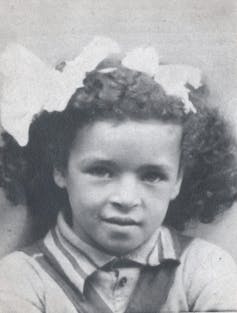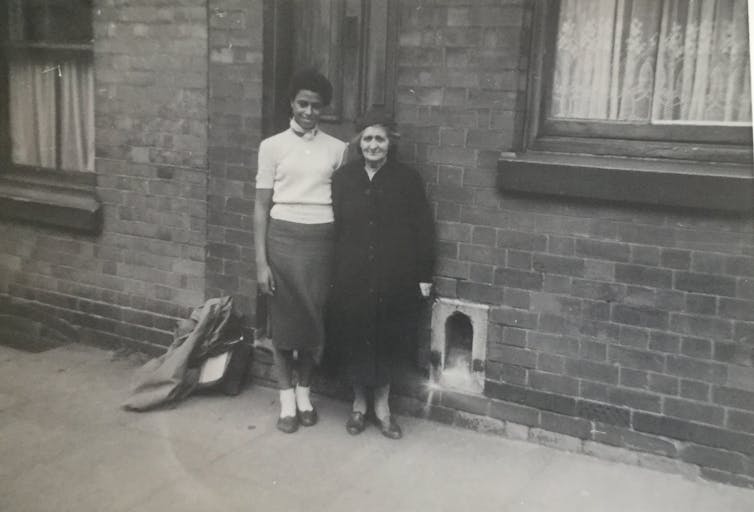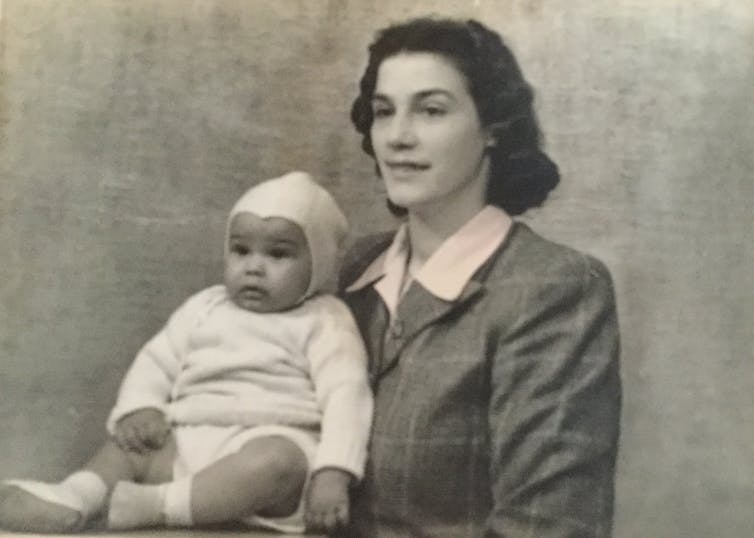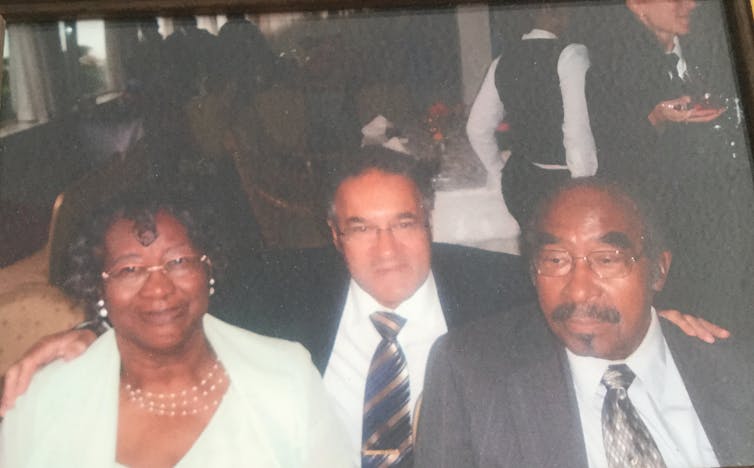Republicans Rejected Mixed Race Babies From Ww2 England
Around 2.2% of the population of England and Wales is now mixed race and 3.3% are from black ethnic groups. During World War II, over lxx years agone, these figures were far lower. And so unsurprisingly, life was difficult for the 2,000 or so mixed race babies who were born in World War II to black American GIs and white British women.
They grew up in predominately white localities and experienced significant racism. I have interviewed 45 of these children (now in their seventies), hailing from all over England. Their story of institutional racism rivals the horrors of the appalling story of the Windrush generation.
Of the 3m U.s. servicemen that passed through U.k. in the period 1942-45, approximately viii% were African-American. The GIs were function of a segregated ground forces and they brought their segregation polices with them, designating towns almost to American bases "black" or "white" and segregating pubs and dances forth colour lines, with dances held for blackness GIs i evening and whites the next.
Inevitably, relationships formed between the black GIs and local women and some resulted in what the African-American press referred to as "brown babies". All these children were built-in illegitimate because the American white commanding officers refused black GIs permission to ally, the rationale existence that back in the U.s., 30 of the so 48 states had anti-miscegenation laws.

The children grew upwardly in predominately white areas – the sites where the GIs had been largely based: due south and due south-westward England, southward Wales, Due east Anglia and Lancashire, where they had little or no black or mixed race role models. Most suffered racism, the stigma of illegitimacy and a confused identity.
Monica, one of the women I interviewed, remembers that in that location were no other mixed race children in her area at all. "That was the hardest part," she told me. "People literally would plow around if I walked into a shop and stare, it was horrible … I was fabricated to feel like a consummate outcast, like I was contaminated."
Jennifer, meanwhile, recalls one particular incident:
At that place was a girl that were very friendly. She told me where she lived and I went to phone call for her ane night. And her female parent opened the door. Oh, she went bananas. Oh, she went mad! I thought she were gonna accept the door off the hinges. Information technology's a good job my fingers weren't in the door, she'd have broke them!
Racist proper name calling was widespread for these children. Gillian, for instance, who grew upwards in Rugeley, Staffordshire, told me that in improver to "blackie" and "nigger", when she got to secondary school her peers started to call her "Gillywog".
The thing that Deborah, born in Somerset in 1945, never got used to was existence pointed at in shops. She remembers that children used to enquire: "Mummy, why is that girl blackness?" The hardest matter, she constitute, "was not knowing why I was unlike. If you've got an identity that includes being blackness, y'all should be proud of information technology".

Stuck in the United kingdom of great britain and northern ireland
Simply nether half of these children were put into children's homes. Few were adopted. Everyone involved in the adoption process appeared to assume that black or mixed-race children were "also hard to place", an attitude that carried on into at to the lowest degree the 1960s. Of the 45 "brown babies" I spoke to, 21 were put into children's homes but only 4 were adopted by not-relatives. Several were adopted past their grandparents, while a few were fostered.
Leon Lomax is the only British "chocolate-brown babe" I have found who was adopted by his US father. In Dec 1945, Somerset County Council, who had 45 mixed-race GI babies in their care, approached the Dwelling house Office to see if they could get the children adopted by "putative fathers, near relatives or other 'coloured' families in the US" ("putative" every bit there was no Dna testing to constitute paternity until the 1960s). But the Habitation Secretary pointed out that it went confronting the Adoption Act, which simply allowed adoption by British subjects or relatives.
In 1948, the government inverse its policy for just over a twelvemonth (the year of Leon'south adoption), only in 1949 reverted dorsum to the ban, despite hundreds of African Americans peachy to prefer the children. It appears that in 1948 the government had become increasingly concerned that they were beingness seen to be shirking responsibleness and of dumping the mixed-race children of British subjects onto the Americans. The Home Role explicitly wanted "to avoid any proffer that nosotros in this country are trying to get rid of the coloured waifs left behind past the American occupation".
Yet government'southward ambivalence towards the "brown babies" remained. The children were non white and therefore not truly "British", since Britishness assumed whiteness. In addition, a mixed-race GI baby stood out equally a visual marker of the black soldier having indeed, as the comedian Tommy Trinder was well-known for quipping, been "over-paid, over-fed, over-sexed and over-here".

Finding fathers
Whether or not they grew upwardly in a children'southward dwelling, nearly all my interviewees knew niggling or nothing almost their fathers. They ofttimes did not fifty-fifty know their father'southward proper noun.
Over the years, some have found their fathers – such is the wonder of Dna testing and its increasing use in the U.s.a.. Many are still finding US relatives, although it is rare that a father is however alive. For Sandi, finding her father'due south wife and hearing that her male parent ever talked of her was a turning point:
I was similar tumbleweed. You know – when you run across them cowboy films and the tumbleweed's simply blowing nigh where the wind takes it. I was similar that. And I was aware of information technology, but I didn't how to change it. And it's about roots. Information technology'southward your roots that stabilise you.
And when James met his male parent in 2000, he told me he felt transformed: "Upward to that point, I never felt whole. There was a part of me missing. And finding me dad was that part. I felt better and settled."

The historian David Olusoga refers to the "Windrush myth": "The widespread misconception that black history began with the coming on that ane ship." The children left behind past the African-American GIs during and after the war are part of this pre-Windrush black British history – a part that has very largely been overlooked. In generously sharing their stories, the children left behind by the African-American GIs during and after the state of war have shone a light on an important simply disregarded attribute of this pre-Windrush black British history.
Source: https://theconversation.com/thousands-of-mixed-race-british-babies-were-born-in-world-war-ii-and-adoption-by-their-black-american-fathers-was-blocked-116790
0 Response to "Republicans Rejected Mixed Race Babies From Ww2 England"
Enregistrer un commentaire